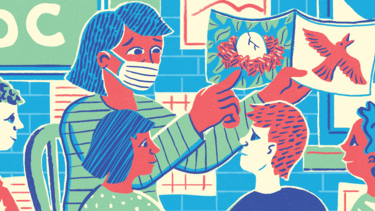Leading through COVID: Providing Childcare for First Responders
In this series, we talk with Yale SOM alumni about their professional and personal lives during the global pandemic. The childcare provider Bright Horizons, founded by Linda Mason ’80, has pivoted to open centers for the children of first responders. Mason says that however devastating the impacts of the pandemic, there are reasons for hope and pride in this crucible moment.

Sean David Williams
Adapted from a phone interview, April 13, 2020.
My husband, Roger Brown, and I are at home in Massachusetts. We are both working from the house exclusively, not going into any office or workplace. We’re healthy. We’re safe. With so many people suffering and struggling, we count our blessings every day.
We have three children. Two are students—one in college, one in graduate school. They are studying from their apartments and are totally fine. Our eldest daughter is a registered nurse working on a COVID floor in a New York City hospital. We are very proud of her and support her, but also, of course, we worry a great deal about her.
Those feelings apply to work as well. We founded Bright Horizons to provide childcare and early education options for families and employers. We had just under 1,200 centers across the U.S. and in Europe in February. Last month, as governors closed schools, we closed nearly 900 Bright Horizons centers. It was a huge blow.
It’s been very emotional for all of us. The executive team is very close knit. They’re working around the clock. We employ a lot of people and fear for their safety, but also worry about the world. This is such a fast-arriving and fast-changing crisis that we can only plan so much. But it has made me incredibly proud to see the organization respond with a spirit of, “I’m going to do what I can to help.”
Seeing that first responders desperately need childcare, we pivoted. Very quickly, we reopened 300 of our centers just for first responders. The focus is largely healthcare systems but we are also providing childcare for pharmaceutical and biotech companies that are developing tests or vaccines who have large numbers of employees who have to go to work every day.
In addition, we’ve started providing in-home care. Many first responders do not live near a childcare center or their work hours don’t align with when the centers are open. So we provide in-home care for up to 5,000 families a day across the country. We either place our teachers or help source other childcare teachers. This has all required a massive shift very quickly, but the team has rallied to make it happen.
Unfortunately, we’ve had to furlough many of our teachers. We haven’t laid them off because we expect that as we move out of this crisis stage and as our childcare centers are able to reopen again, they will be able to return to work.
The teachers who continue working, in a center or in a home, are putting themselves at risk. No one is required to do so, but many have just raised their hand and said, “Let’s do our part during this crisis.”
To minimize risk, we have very strict protocols. With children, we’re not social distancing, but we are limiting group sizes and overall center capacity. We’re very diligent with intensive hygiene and cleaning practices. Our teachers wear masks. We have a partnership relationship with the Harvard School of Public Health, so we are in constant contact with epidemiologists and stay on top of what the science is saying.
Bright Horizons has also recently partnered with First Responders First, a coalition with Thrive Global, Harvard School of Public Health, and the Creative Artists Agency Foundation, to provide free childcare for healthcare workers. We have opened six of these centers. We expect to open more soon. They are fully funded by donors.
Before starting Bright Horizons, I had a career in international refugee relief. Doing crisis work around the world, you see who rises to the challenge of leadership in a crisis. I always thought Stephen Kramer, our Bright Horizons’ CEO, was a great leader, but seeing the intelligence, heart, and soul that’s gone into his leadership, I’m astounded.
It’s a crucible moment for leaders, in our government as well as in our private and nonprofit sectors. I tend to focus on examples of people rising to this challenge rather than some of the ugly stuff that’s happening. And I’m seeing leaders rise up around the country. I can only hope that we can emerge from this crisis a stronger country and culture. We’ll see.